Interview with Miland “Mille” Petrozza (Kreator vocalist, guitarist) (03-21-10)
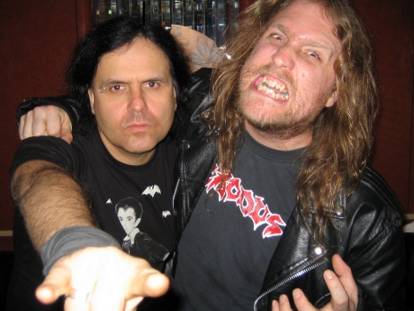
Q (Will Carroll “WC” of Death Angel): The new record [Hordes of Chaos (2009)] has a fantastic sound, very warm and natural. The sound is quite different than the last two albums [Violent Revolution (2001) and Enemy of God (2005)] that were slick and mechanical, similar to Extreme Aggression (1989) and Coma of Souls (1990). Do you plan to continue with the new approach?
Mille Petrozza: We are talking about it. It is like learning. We recorded Hordes of Chaos (2009) in a live situation, which is not very common for bands. There are more comfortable ways of working. On the other hand, if you work the way we did on Hordes of Chaos (2009) you get a different form of energy, which is more pure than what you can achieve in a studio. The studio is more for laying down the perfect track, laying down the best possible performance. When you record [live] as a band you also try to get the perfect track and possible performance but as a band rather than each individual member. It is a different way of doing things. We feel comfortable with it. We might do it again, but with even more perfection. We want to go into more details for perfectionism. The songwriting on the last album [Enemy of God (2005)] was done for a different recording. If we do this again, we want to attach the songwriting to the recording style. We sometimes had a hard time recording complicated riffs [in a] tight [fashion]. It was a lot of hard work. So me might come up with some less complicated riffs on the next record, which will still be complicated enough (laughter). On this record we tried to do weird harmonies [and] fast stuff.
WC: How long did it take to record the basic tracks on Hordes of Chaos (2009)?
MP: 10 days. We did some overdubs, melody guitars and vocals.
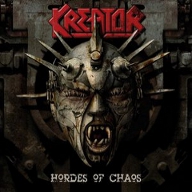 WC: So the drums, bass, and rhythm guitars were done in 10 days?
WC: So the drums, bass, and rhythm guitars were done in 10 days?
MP: Yes.
WC: That is pretty impressive considering the length of the songs and live recording?
MP: Yeah.
WC: When was the last time you recorded live?
MP: We never really recorded that way. But Pleasure to Kill (1986) came very close because we recorded the basic tracks as a band, but we then replaced the rhythm guitars. We didn’t replace the rhythm guitars on Hordes of Chaos (2009). We worked with a producer named Moses Schneider in Germane who is very famous for that [recording live] in Germany. I know a lot of producers in the [United] States also work that way. But it is more work. It is more rehearsals, listening to the songs over and over gain, rearranging the songs, and being very, very prepared in the studio.
WC: It means a s**tload of preproduction.
MP: Exactly. When you do it the other way around, going into the studio nowadays with technology like Pro Tools the actual recording is a lot easier. You can go into the studio less prepared and still work on stuff while you go.
WC: Whose idea was it to record live on Hordes of Chaos (2009)?
MP: Moses [Schneider], our producer.
WC: How did you hook up with him [Moses Schneider]?
MP: We liked some of the stuff he did for German bands. He recorded some punk rock and avant-garde bands we really liked. His productions have something to them. He is different. But on the other hand, if you listen to the production it sounds 100 percent like Kreator. This is probably something more for nerds like us who listen to production. A lot of people don’t [listen to production]. It’s whatever comes across, whatever the record makes you feel. It doesn’t necessarily have to do with the way you produce it. It can help, but it doesn’t have to. It can make a different [but] it can also be the same.
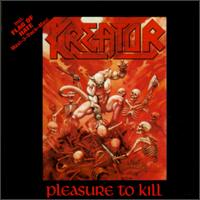 WC: If you look at Kreator’s back catalog, you seem to do things in twos. Extreme Aggression (1989) and Coma of Souls (1990) are sister albums. Violent Revolution (2001) and Enemy of God (2005) are sister albums. So maybe your next album will be the sister to Hordes of Chaos (2009) ?
WC: If you look at Kreator’s back catalog, you seem to do things in twos. Extreme Aggression (1989) and Coma of Souls (1990) are sister albums. Violent Revolution (2001) and Enemy of God (2005) are sister albums. So maybe your next album will be the sister to Hordes of Chaos (2009) ?
MP: Yeah, yeah.
WC: What is your favorite Kreator album cover?
MP: Pleasure to Kill (1986). It is the trademark album cover, like the Misfits’ Chrimson Ghost [Figure that became the Misfits’ mascot and logo and first appeared on the Horror Business single (1979)]. Every year we go out we still have it [Pleasure to Kill (1986)] in the merchandise and it is the second best selling shirt every time. It is amazing. I really like the way it looks. It has this weird vibe to it that is to me one of a kind. You cannot reproduce it. We are very luck to get that cover.
WC: Whose concept was the cover artwork for Pleasure to Kill (1986)?
MP: Phil Lawvere. It was not even supposed to be our album cover. It was just one of his paintings.
WC: How about the album artwork for Terrible Certainty (1987)?
MP: He [Phil Lawvere] made that specifically for us. I like that as well. The bridge you see [on the album artwork] is a bridge in Prague [Czech Republic]. It really exists.
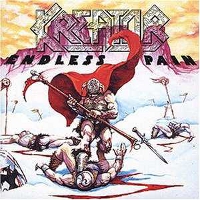 WC: Another cool thing about Terrible Certainty (1987) is there is a back cover artwork as well. That is really cool. A lot of bands don’t do that any more?
WC: Another cool thing about Terrible Certainty (1987) is there is a back cover artwork as well. That is really cool. A lot of bands don’t do that any more?
MP: Yeah. That is true.
WC: Is there a name for your mascot?
MP: No, it is just a Kreator demon.
WC: I think he is the coolest mascot, better than Eddie of Iron Maiden.
MP: (laughter)
WC: That was a creation by Phil [Lawvere]?
MP: Yeah. It just happened to be our guy. On Endless Pain (1985) he [the Kreator demon] was not really there, [other than] maybe the [caped, helmeted] guy that kills the other guy. But as we went he became the mascot.
WC: Is the Kreator demon supposed to be on the cover of Renewal (1992) with the praying mantis?
MP: Yes, in a way. But he is very hard to recognize. The artist who did the cover artwork for Renewal (1992) has very much his own style. I could not talk him into making an exact copy of the Kreator demon on the Coma of Souls (1990).
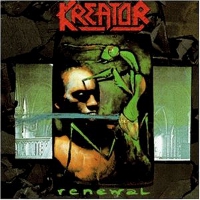 WC: Renewal (1992) is my favorite Kreator album.
WC: Renewal (1992) is my favorite Kreator album.
MP: Most people would say Pleasure to Kill (1986), Extreme Aggression (2001), or Violent Revolution (2001)
WC: How do you feel about Renewal (1992)?
MP: I like the songwriting on it. But every time I hear that album I am going back into the mind frame that I was in at the time. We were smoking so much weed while we were writing it. The whole album is about smoking, getting high, and doing drugs. Basically we were smoking and doing mushrooms. From today’s point of view, I would be interested in how it would have sounded if we would not smoked so much weed. But then again, maybe it [smoking weed] was a good thing. I know a lot of people who love it.
WC: It has a weird vibe to it.
MP: Yeah. It is definitely a getting high “trippy” album.
WC: Renewal (1992) was the first adventurous thing Kreator has ever done.
MP: Yeah. True.
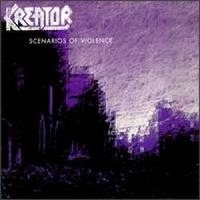 WC: The compilation Scenarios of Violence (1996) has remixes. Was it that you were not happy with the original drum sound or original mix?
WC: The compilation Scenarios of Violence (1996) has remixes. Was it that you were not happy with the original drum sound or original mix?
MP: I cannot be 100 percent supportive of Scenarios of Violence (1996). To me those albums don’t even exist. There is another compilation, Voices of Transgression (1999). I do not think those [compilations] are necessary. Then they asked us to give some bonus tracks. We tried to do something different. We knew the original tracks are already there. I think it’s f**kin’ lame for thrash metal bands to record a “best of” album. So we said, “F**k this.” The label then asked up to participate and be creative. We tried to do re mixes. To me those records are not really a part of our history.
WC: So those remixes [on Scenarios of Violence (1996)] were done by you?
MP: Yeah, but still . . . . One thing I like about the remixes is the remix of Karmic Wheel.
WC: The sample is louder, more effective.
MP: Yeah. When we were originally recording Karmic Wheel [for Renewal (1992)] we wanted the samples that loud as well. But the producer, Tom Morris, was saying we could get in trouble by offending the family of the politician in the samples that kills himself on live TV. We also wanted to have the samples be more of a background thing so people don’t really know what is going on and do some research. On the re mix you can hear it right there. That is how I would have wanted to originally be.
Q (Arash Moussavian “AM”): The second compilation is Voices of Transgression (1999) is just the 90’s Kreator catalog?
MP: It is just s**t. The record companies put those out when we split. I always think of those as lame because we never felt like we need them. We always wanted to make a live album, even back in the day. But the labels said, “No, you don’t need to.”
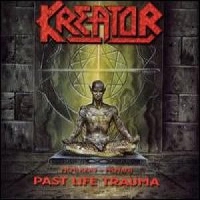 WC: Is the Past Life Trauma (2000) compilation approved by Kreator?
WC: Is the Past Life Trauma (2000) compilation approved by Kreator?
MP: That is the one compilation I can live with. It is okay.
AM: Do you think Renewal (1992) would have sounded more aggressive if you had not been smoking so much weed at the time?
MP: I think the riffs would have been more complex, more like Coma of Souls (1990). You have to understand when we recorded Coma of Souls (1990) I just turned 23. All our musical career was based on thrash metal. [After Coma of Souls (1990)] we wanted to do something different. We said, “This can’t be all. We know how to do this. Let’s try something else.” Of course some people don’t want their bands to change, which is why we got a lot of criticism from people who said, “How can you betray the band’s legacy.” But we were so young and wanted to try something else. Other bands during that era would split up. We continued and recorded.
WC: Kreator is one of the only bands from the 80’s thrash scene that did not split up.
MP: Yeah.
WC: When recording Renewal (1992) were you getting pressure from the record label to do a death metal album because it was popular at the time.
MP: No. The producer for Coma of Souls (1990) Randy Burns did not want to produce records any more. He went out of business and moved onto computer programming. So we were looking for a new producer. We had many people in mind and tried so many people out. Working at Morrissound Studios [Tom Morris’ studio in Tampa, Florida] wasn’t the record company’s idea. It was basically our idea because there is a great studio there, and we like to record in the US. Every band that used Randy Burns got that death metal sound. We wanted to use Tom Morris because we knew he was doing different stuff, more hard rock. When Tom Morris mixed the album, we didn’t like the first mix because it was not heavy enough. So we kind of mixed the album.
WC: Do you consider Pleasure to Kill (1986) a death metal or thrash metal album?
MP: Mixture. When we recorded Pleasure to Kill we were kids. Pleasure to Kill was influenced by three albums, Venom’s Black Metal (1982), Possessed’s Seven Churches (1985), and Slayer’s Hell Awaits (1985). We combined these sounds on Pleasure to Kill. If you listen to Pleasure to Kill you hear a lot of Possessed influences. The first song, Rippin Corpse, is very much based on Possessed’s riff to The Exorcist [off Seven Churches (1985)]. I was very much influenced by the album [Seven Churches (1985)]. At the time it was my favorite album. Of course we wanted to make it heavier.
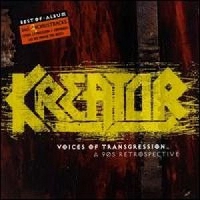 WC: What are your currently feelings about Noise Records [to which Kreator was signed from 1985-1992].
WC: What are your currently feelings about Noise Records [to which Kreator was signed from 1985-1992].
MP: I have made my peace with the past. It is not like I look back and think they ripped me off. Of course they did. Back in the day everybody got ripped off by record companies. On the other hand they made it possible that we were recognized. Maybe we should have signed a different record deal. But in 1985 there were not many labels interested in this type of music. If we would have come out in 1987 it would have been too late. We were in the right place at the right time. We were way too young when we recorded Endless Pain (1985). We were not ready yet. The album is all over the place, not very tight. On the other hand it was necessary to put it out at that time to be one of the firsts. If we would have put it [Endless Pain (1985)] out in 1987 there would have been tons of thrash metal bands. It would not have gotten the recognition. We are happy with the way things went. Everything happens for a reason. I do not say, “Noise Records ripped us off. If it would have been a different label, the band would not have been ripped off.” No. This is how it is. We achieved a lot. We still keep touring. At the moment the band’s doing great.
WC: When you were on Noise Records, Kreator was one of their biggest bands.
MP: Exactly. At the time the biggest band on Noise Records was Celtic Frost. But Tom [G. Warrior, Celtic Frost’s vocalist/guitarist] did not realize Celtic Frost was the biggest band. The head of Noise Records was a big fan of Celtic Frost. He said, “Celtic Frost was the most professional band he ever worked with because they have a vision and have their s**t together.” [In comparison] we were a bunch of kids. Celtic Frost was five years older than us. They had their s**t together. They were artists. We were thrash kids. We still have our leather and denim jackets with patches. That was us. Celtic Frost was already there. But they were at least five years older than us. They also had a different background. We came from working class [German] families, and they lived Switzerland where they were surrounded by art.
WC: Over the years you have gotten more politically aware in your lyrics because you have matured. What do you think of Barrack Obama’s recent health care reform bill [extending health care to millions of uninsured Americans and cracking down on insurance company abuses]?
MP: I think Obama did the right thing. I talked to some of my friends in Portland yesterday. I was not aware of how much it can ruin you financially if you hurt yourself [and receive medical care]. If you break your arm you get a bill for thousands of dollars. Then you are in debt because you have to pay it back. I think Obama is still a politician. He has to play the game because the country, any country, is run by the corporations. As far as I can judge it from my point in Germany Obama seems to have some good ideas. He is definitely better than the one before.
AM: Who shall remain nameless.
MP: Yeah! (laughter).
WC: There is a birth of young thrash bands. Do you have any favorites?
MP: Evile [United Kingdom] is not bad. Warbringer [United States]. Violator from Brazil is really good. Legion of the Damned from Holland. A Greek band called Suicide Angels. I like a lot of little bands that are really good. I am still waiting for one of those bands with the writing skills to get together and come out with a classic thrash album that blows everyone away.
WC: Is there a good thrash scene in Germany?
MP: Yeah. It has gotten bigger and bigger in the last couple of years. There are definitely a couple of bands that could come up with something. But they need to take the time and do their homework.
WC: And they can’t completely live off the past.
MP: Yes. Sometimes when I listen to those bands I say, “Okay. They took [ripped off] the riffs, sound, and the image. Now write the f**kin’ songs.” You know what I mean?
AM: How about your thoughts on bands from the past that have revived their career? I know you toured with Exodus in 2009. What did you think of Exodus’ Tempo of the Damned (2004).
MP: That is really good. I was really surprised. It is one of the best comeback albums by a thrash band. I really like it when bands do it for the right reason. There are a couple of bands when I say, “Why are you coming back right now at this point?” But if they come out with great albums it is fine. Like Heathen, to be honest I was not expecting much. But when I heard the new album it is f**kin’ great man. The riffs are good.
AM: How about Celtic Frost’s Monotheist (2006)?
MP: Tom’s new Tryptikon material sounds better. I was a little bit disappointed with Monotheist. The songs were too slow and long.
AM: How about the production on Monotheist (2006)?
MP: The production was good. But the production on Tryptikon sounds better.
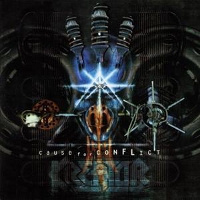 WC: What has been your favorite US tour?
WC: What has been your favorite US tour?
MP: I like them all. I like this one [with Kataklysm, Evile and Lightning Swords of Death]. I like touring in general. The last time we toured it was with Exodus. It was great that Exodus was on the bill. When the vibe on tour is great it is what I like. On this tour it seems like I don’t really speak with the other bands too much. Exodus are great. We also played with Exodus in South America as part of a world tour.
WC: The first time I saw Kreator was on the Extreme Aggression tour (1989) with Coroner [Switzerland]. Do you like Coroner.
MP: I like Tommy [Vetterli, Coroner guitarist, ex-Kreator guitarist] a lot. Ron [Broder, Coroner bassist/vocalist] was too shy as a frontman. But Coroner was still a great band.
WC: Let’s talk about Cause for Conflict (1995). After Renewal (1992) did you feel it’s time to . . .
MP: When I think back to the period from Renewal (1992) to Cause for Conflict (1995), it was weird. The new drummer in the band [Joe Cangelosi, Kreator drummer 1994–1996] didn’t know much and was too involved in the songwriting. Cause for Conflict (1995) is definitely my least favorite of our Kreator albums.
WC: Cause for Conflict (1995) is a hardcore record. Did you plan to make it a hardcore record?
MP: Yeah. This was definitely the album where we did not know what we were doing. On the one hand we didn’t want to go too experimental. On the other hand we didn’t want to go too much into thrash metal but [we] also [wanted to] have something else. There was just too much thinking involved. The album came from the heart and there definitely some good songs on that record. But something about the album doesn’t feel right.
AM: Maybe you lost the momentum along the way?
MP: Maybe. Maybe we should have made a break at that point and got the record out.
WC: On Hordes of Chaos (2009) did you intentionally record 10 songs?
MP: Yeah. Short and sweet.
WC: Did you record any extra tracks?
MP: We recorded one track without vocals. I still cannot think of any words for that song. We recorded two more cover songs, a Bad Religion song and a song by a German band.
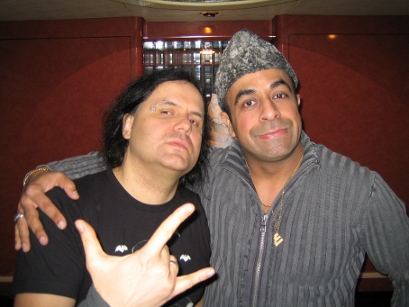
Arash Moussavian, Entertainment Law Attorney
arashmoussavian@cal.berkeley.edu
http://www.linkedin.com/in/arashmoussavian
All photos taken by Arash Moussavian. This article and all photos are protected by copyright. Please contact me prior to use, or I will make shish kebab of your loins.
















